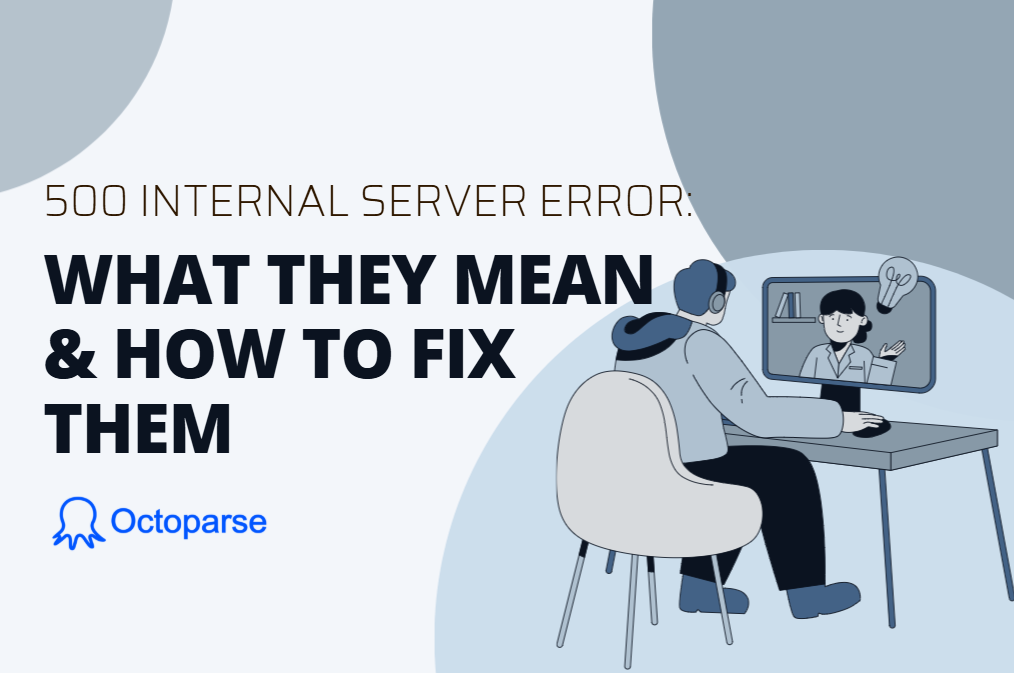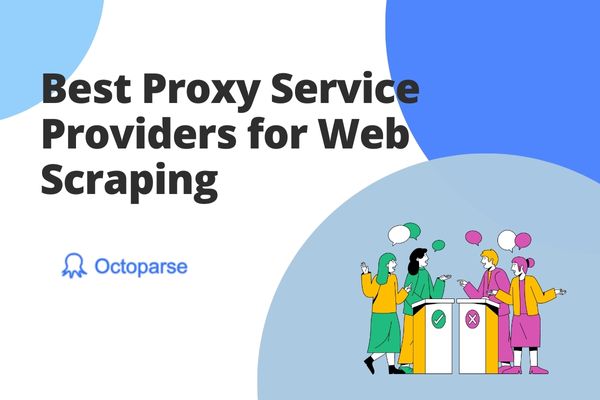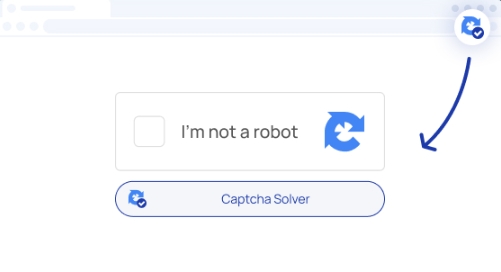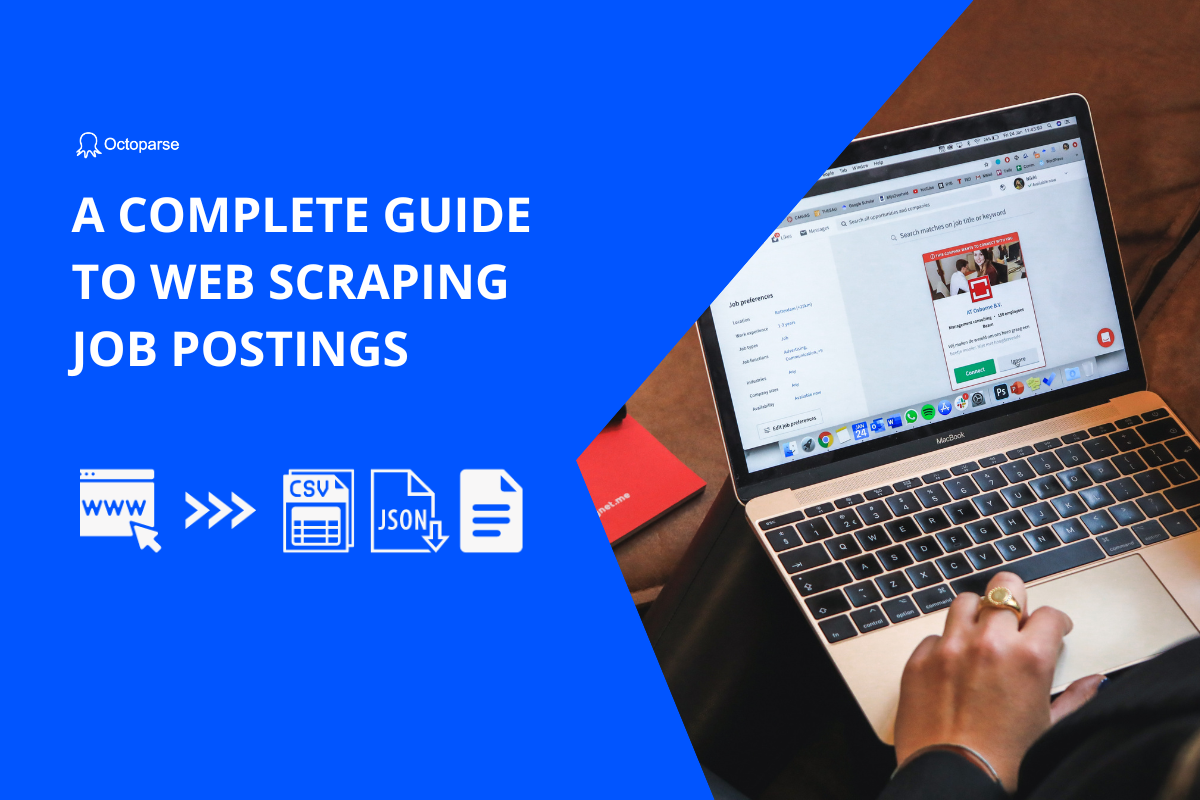GDPR compliance means meeting the requirements of the General Data Protection Regulation by implementing proper safeguards for collecting, processing, and storing personal data of EU residents. For web scrapers, this involves having a lawful basis for data processing, minimizing data collection, respecting data subject rights, and maintaining transparent documentation of all data handling activities.
Recently, Poland imposed a Euro 220,000 fine on an organization that collected data of around 7 Million people but failed to inform them (informing individuals is a rule under Article 14 of GDPR).
Also, a few months back, French DPA issued guidance related to commercial web scraping. So, we thought of explaining what GDPR means and why it matters to the scraping community.
This guide answers the essential question: what does it mean to be GDPR compliant when scraping the web? We’ll break down exactly what GDPR compliance requires, who needs to comply, and how to ensure your data extraction projects stay on the right side of the law.
Key takeaways:
1. GDPR applies when you scrape personal data of EU residents, regardless of where you’re located
2. You must have a lawful basis—typically legitimate interest for web scraping—with proper documentation
3. Minimize data collection, set retention limits, and document everything
4. Respect technical objections (robots.txt, CAPTCHA) as they affect your legal position
5. Be prepared to handle access, deletion, and portability requests from data subjects
6. Non-compliance can result in fines up to €20 million or 4% of global revenue
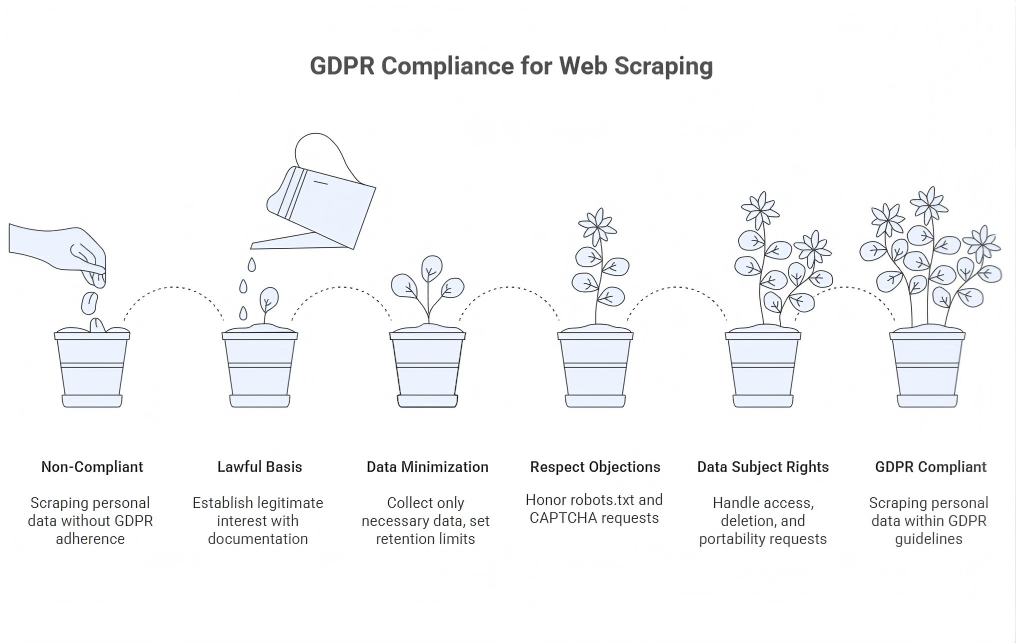
What Is GDPR Compliance? Definition and Core Meaning
GDPR compliance means an organization meets all requirements set forth by the General Data Protection Regulation (EU) 2016/679 for properly collecting, using, storing, and protecting personal data of individuals within the European Union and European Economic Area (EEA).
At its foundation, GDPR serves two primary purposes:
- Empowering individuals: Putting EU citizens in control of how their personal data is collected and used
- Simplifying regulation: Creating a unified regulatory framework for businesses operating in the EU region
Being GDPR compliant is about demonstrating that you follow them. As the regulation states: if you think you’re compliant but cannot prove how, then you’re not actually compliant. Documentation and accountability are central to GDPR compliance.
Why GDPR Compliance Matters Now
The Clearview AI Precedent (2024)
The most critical case for web scrapers is Clearview AI. The company built a massive facial recognition database by scraping billions of images from public websites. This business model triggered a coordinated regulatory assault across Europe:
- Italian DPA: €20 million fine
- Dutch DPA: €30.5 million fine (September 2024)
- Additional €5.1 million penalty if violations continue
- Personal liability being considered for company management
The Dutch DPA found that Clearview failed to inform individuals about the use of their data, didn’t offer access or deletion rights, and continued processing data despite ongoing investigations. (Source: EDPB)
The KASPR Case: LinkedIn Data Scraping (December 2024)
In December 2024, France’s CNIL fined KASPR €240,000 for scraping contact details from LinkedIn—even when users had restricted visibility of their information. KASPR’s database contained approximately 160 million contacts. Key violations included:
- Collecting data from users who had chosen to limit visibility to 1st and 2nd-degree connections
- Automatic renewal of data storage without consent
- Failing to inform data subjects in a language they understand
- Not properly responding to access requests
The CNIL set a compliance deadline of June 18, 2025. (Source: CNIL)
The Polish Data Broker Fine
Poland’s DPA imposed a €220,000 fine on a data broker that scraped public business registries affecting 6.5 million people. The company argued that notifying millions of people was a “disproportionate effort.” The DPA rejected this, ruling that since the company already had contact details as part of the scraped data, notification was feasible and required.
When Does GDPR Apply to Web Scraping?
Not all web scraping falls under GDPR jurisdiction. The regulation specifically applies when you’re scraping personally identifiable information (PII) of individuals residing in the EU or EEA. If you’re scraping non-personal data like product prices, stock indexes, or news articles without any personal identifiers, GDPR typically doesn’t apply.
What Data Can You Scrape Without GDPR Concerns?
You can typically scrape the following types of data without triggering GDPR requirements:
- Real estate listings and property advertisements → See: Web Scraping for Real Estate
- Stock market data and financial indexes → See: Stock Market Analysis Using Web Scraping
- Job posting descriptions (excluding candidate data) → See: Web Scraping Job Postings
- Product information from eCommerce sites for price intelligence → See: Price Scraping Tools
- Public government statistics and datasets
- News articles and blog content for market research → See: How to Scrape News and Articles
What Qualifies as Personal Identifiable Information (PII)?
GDPR defines personal data broadly as any information that can directly or indirectly identify an individual. For web scrapers, this includes:
| PII Category | Examples |
|---|---|
| Direct Identifiers | Name, email address, phone number, postal address |
| Financial Data | Credit card numbers, bank account details |
| Online Identifiers | IP address, cookie IDs, device fingerprints |
| Demographic Data | Date of birth, age, gender, nationality |
| Visual/Audio Data | Photographs, videos, voice recordings |
| Professional Data | Employment details, job titles, work history |
| Health Data | Medical records, health conditions (special category) |
Important geographic limitation: If you’re scraping data exclusively from non-EU sources (such as India, USA, or Australia) that doesn’t concern EU residents, GDPR doesn’t apply. However, you must still comply with local data protection laws in those jurisdictions.
Related: For comprehensive guidance on the broader legal landscape beyond GDPR—including terms of service, CFAA, and copyright considerations—see our guide Is Web Scraping Legal? It Depends.
The 7 Key Principles of GDPR Compliance
GDPR is built on seven foundational principles that every compliant organization must follow:
1. Lawfulness, Fairness, and Transparency
You must have a legitimate legal basis for processing personal data and be transparent about how you collect and use it.
2. Purpose Limitation
Data can only be collected for specified, explicit, and legitimate purposes. You cannot scrape data for one purpose and then use it for something entirely different without new consent.
3. Data Minimization
Only collect data that is “adequate, relevant, and limited to what is necessary” for your stated purpose. Don’t scrape entire profiles when you only need email addresses.
4. Accuracy
Personal data must be accurate and kept up to date. Inaccurate data should be erased or rectified without delay.
5. Storage Limitation
Data should only be kept for as long as necessary to fulfill the original purpose. Establish clear retention policies and deletion schedules.
6. Integrity and Confidentiality (Security)
Implement appropriate technical and organizational measures to protect personal data against unauthorized access, loss, or destruction.
7. Accountability
You must be able to demonstrate compliance with all GDPR principles. This means maintaining detailed records, conducting impact assessments, and documenting your data protection efforts.
Are You Scraping the PII of EU Citizens?
GDPR is strictly concerned with personally identifiable information of individuals within the European Union and the European Economic Area (EEA). So, the next question that arises is are you scraping data of European citizens? If the answer is a ‘No’, then you’re safe. So, let’s say, if you’re scraping data that concerns India, the USA, or Australia, then you need not worry about GDPR. Instead, you should be looking for data protection laws within their respective jurisdiction. GDPR jurisdiction is limited to EEA. If your scraping projects need you to scrape the PII of EU citizens, you must have a lawful ground to do so.
Do You Have a Lawful Ground for Scraping Personal Data?
The lawful bases are set out in Article 6 of GDPR, and there are six lawful bases for processing scraped data:
What the EDPB and CNIL Say About Lawful Basis
The European Data Protection Board (EDPB) ChatGPT Taskforce Report (May 2024) provides critical guidance on lawful bases for web scraping. The report explicitly states that:
- Consent is unlikely to serve as a valid legal basis for web scraping due to the large-scale data collection and the difficulty of identifying whose data will be scraped
- Contractual necessity is also unlikely since there’s no direct relationship between the scraper and data subjects
- Legitimate interest is recognized as the most common basis, but requires careful balancing of interests and strong technical safeguards
(Source: EDPB ChatGPT Taskforce Report)
The French CNIL issued detailed guidance on June 19, 2025 specifically addressing web scraping for AI development. Key points include:
- Legitimate interest requires a three-part test: (1) the interest is legitimate, (2) processing is necessary, (3) it doesn’t disproportionately affect data subjects
- Controllers must define precise collection criteria in advance
- Websites that object to scraping via robots.txt or CAPTCHA must be respected
- Data collection should be limited to freely accessible data (no login required)
1. Consent
The data subject has given explicit, informed consent for you to collect and process their personal data for a specified purpose. This is the clearest path to compliance but often impractical for large-scale scraping.
2. Legitimate Interest
Processing is necessary for your legitimate business interests, provided these interests don’t override the fundamental rights of the data subject. This is the most commonly used basis for web scraping, but requires a documented Legitimate Interest Assessment (LIA).
Other Lawful Bases (Less Common for Web Scraping)
- Contract: Processing is necessary to fulfill a contract with the data subject
- Legal Obligation: Processing is required to comply with a legal requirement
- Vital Interests: Processing is necessary to protect someone’s life
- Public Task: Processing is for official governmental functions or public interest
GDPR Compliance Checklist for Web Scraping Projects
Follow this step-by-step checklist to ensure your web scraping activities are GDPR compliant:
Step 1: Conduct a Data Protection Impact Assessment (DPIA)
Before beginning any scraping project, assess what personal data you’ll collect, identify privacy risks, and document mitigation strategies. A DPIA is particularly important when scraping cannot comply with Article 14’s notification requirements.
The CNIL recommends conducting a DPIA when model training involves large-scale data scraping, novel content types, or special category data.
Step 2: Establish Your Lawful Basis
Document which of the six lawful bases applies to your processing. For legitimate interest claims, complete a Legitimate Interest Assessment that balances your business needs against data subject rights.
Per the CNIL guidance, your assessment must demonstrate:
- The interest pursued is clearly lawful and well-defined
- Processing is genuinely necessary (not just convenient)
- Appropriate safeguards limit impact on individuals
Step 3: Minimize Data Collection
Configure your scraper to collect only the data fields essential for your stated purpose. Use filters to exclude sensitive or irrelevant information in real-time.
Mandatory measures under Article 5.1(c):
- Define precise collection criteria in advance
- Apply filters to exclude unnecessary data categories
- Delete non-relevant data collected in error immediately
- Exclude websites containing primarily sensitive data or information on minors
Step 4: Set Clear Data Retention Policies
Define how long you’ll keep scraped data and implement automated deletion schedules. For example, you might retain pricing data for 12 months, then anonymize or delete it.
Step 5: Inform Data Subjects (Article 14)
GDPR requires you to inform individuals when you’ve collected their data from sources other than themselves. This notification must occur within one month of collection and include your identity, processing purposes, and their rights.
Critical note from enforcement: The “disproportionate effort” exemption under Article 14(5)(b) has been interpreted very narrowly by regulators. If you have the contact details in your scraped data, you’re generally expected to use them for notification.
Step 6: Implement Data Subject Access Rights (DSAR)
Build systems to handle data subject requests, including:
- Right of access: Provide copies of personal data upon request
- Right to rectification: Correct inaccurate data within 30 days
- Right to erasure: Delete data when consent is withdrawn
- Right to data portability: Export data in a machine-readable format
Step 7: Respect Technical Objections to Scraping
The CNIL explicitly states that failure to comply with website restrictions (robots.txt, CAPTCHA) means processing does not meet reasonable expectations of data subjects.
Related: Learn more about technical considerations in Tips for Web Crawling Without Getting Blocked
Step 8: Report Data Breaches
Article 33 requires you to notify the relevant supervisory authority within 72 hours of discovering a data breach that poses risk to individuals’ rights and freedoms.
Step 9: Verify Third-Party Compliance
If you use residential proxies, data providers, or other third-party services, ensure they’re also GDPR compliant. Your compliance chain is only as strong as its weakest link.
Related: See our guide on Best Proxy Service Providers for Web Scraping for compliance-focused options.
GDPR Penalties and Enforcement in 2025
Non-compliance with GDPR carries severe consequences:
- Maximum fines: Up to €20 million or 4% of global annual revenue, whichever is higher
- Personal liability: The Dutch DPA is considering holding Clearview AI’s directors personally accountable—a precedent that could expand
- Reputational damage: Data breaches and regulatory actions become public, damaging customer trust
- Compensation claims: Data subjects can seek compensation for damages caused by non-compliance
Enforcement Trends from 2024-2025
According to the CMS GDPR Enforcement Tracker Report:
- Spain leads enforcement activity with 932 fines
- The most common violation category: insufficient legal basis for processing
- Regulators are increasingly focused on transparency violations and failure to respect data subject rights
- Cross-border coordination between DPAs has intensified
What Can You Do to Be GDPR Compliant?
Here’s a checklist for you to ensure your scraping and data processing project is GDPR compliant:
Stay away from the wrong interpretation of the articles in GDPR regulation
One myth is any publicly available PII data is scrapable and usable for marketing or some other purpose. This is not the case. Consent or Legitimate interests could only be the legal basis for processing PII data even if it is publicly available. So, you can’t launch marketing campaigns on email IDs obtained from comment sections of social media if they belong to EU citizens/websites.
Get Consent
This is a no-brainer. If you do not have a solid legitimate interest in obtaining PIIs, getting consent is the only way out.
Inform Individuals About Data Collection
Article 14 of the GDPR makes it necessary to inform all individuals whose data has not been directly collected from them.
Ensure DSAR is preserved
EU residents have the right to request a copy of the data that they possess, withdraw consent to scrape/keep their data, or even request deletion of their data. You need to ensure that your project complies with Data Subject Access Rights (DSAR).
Report Data Breach
Article 33 of the GDPR requires you to inform the supervisory authority in case of a data breach within 3 days unless the personal data breach is unlikely to be a threat to the fundamental rights of an individual.
Data Protection Impact Assessment (DPIA)
In case, you can’t oblige with Article 14 of GDPR which necessitates informing individuals about their data collection, you need to get DPIA.
Make sure your residential IP proxies are GDPR compliant too
Companies or data scrapers often make use of residential IP proxies to scrape the web at scale, or to overcome anti-scraping techniques implemented by websites.
Audit your new & old scraping projects iteratively
It makes sense to audit all your existing, new, and old scraping projects to check if they are GDPR compliant or not and accordingly intervene as and when necessary.
When GDPR Does and Doesn’t Apply
Consider a fashion retail website with product reviews that include shopper information:
✅ GDPR-Free Scenario: You scrape only the review text and timestamps to analyze customer sentiment for product development. No personal data is collected, so GDPR doesn’t apply.
⚠️ GDPR-Required Scenario: You scrape reviewer names, ages, locations, and profile pictures along with their reviews. You’re now collecting personal data and must establish a lawful basis, provide notification, and respect all GDPR requirements.
Related: For guidance on scraping product data without PII, see The Easiest Way to Extract Data from E-Commerce Websites
Frequently Asked Questions About GDPR Compliance
1. Is GDPR compliance mandatory for web scraping?
Only when you scrape personally identifiable information of EU/EEA residents. Scraping non-personal business data, product information, or public statistics typically doesn’t require GDPR compliance.
2. How do I know if my scraped data contains PII?
If any data point can directly identify an individual (name, email, photo) or be combined with other data to identify them (IP address, location data, unique IDs), it’s likely PII under GDPR.
3. Can I scrape email addresses from websites?
Email addresses are personal data. While technically possible to scrape them, you cannot use them for marketing campaigns without consent. Simply finding an email on a public website doesn’t grant you permission to contact that person.
Related: See our important considerations in Scrape Email Addresses for Lead Generation
4. What’s the difference between GDPR compliance and being legal to scrape?
GDPR compliance specifically addresses data protection for personal data. The broader legality of web scraping involves additional considerations like terms of service, copyright law, computer fraud laws, and database rights. A scraping project can be GDPR compliant but still violate other laws.
Related: Our comprehensive guide Is Web Scraping Legal? It Depends covers these broader considerations including the HiQ vs. LinkedIn case.
5. Do I need to appoint a Data Protection Officer (DPO)?
A DPO is required if your core activities involve large-scale systematic monitoring of individuals or processing special categories of data (health, religion, political beliefs). Many web scraping operations don’t meet this threshold, but it’s good practice to designate someone responsible for data protection.
6. Can I rely on legitimate interest for lead generation scraping?
Potentially, but it requires careful documentation. You must demonstrate that your interest is legitimate, the processing is necessary (not just convenient), and it doesn’t override individual rights. For B2B lead generation, the bar may be lower than for consumer data, but you still need proper assessment and safeguards.
Conclusion
Understanding what it means to be GDPR compliant is essential for any organization that extracts data from the web. While GDPR has fundamentally changed how businesses approach personal data collection, compliance is achievable with proper planning and processes.
The enforcement landscape has shifted dramatically. With cases like Clearview AI (€50M+), KASPR (€240K), and the Polish data broker (€220K), regulators have made clear that “public data” is not a free pass for scraping personal information.
By implementing the checklist and best practices outlined in this guide—informed by the latest EDPB and CNIL guidance—you can harness the power of web scraping while maintaining full GDPR compliance. The goal isn’t to avoid data collection—it’s to do it responsibly, transparently, and in a way that respects individual privacy rights.

